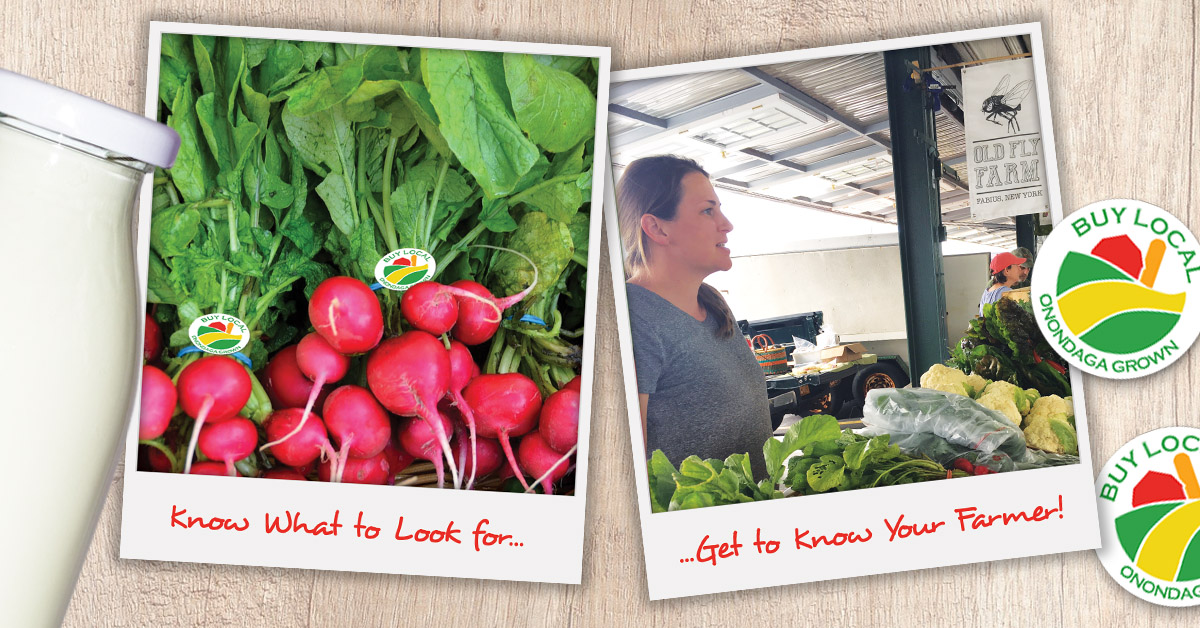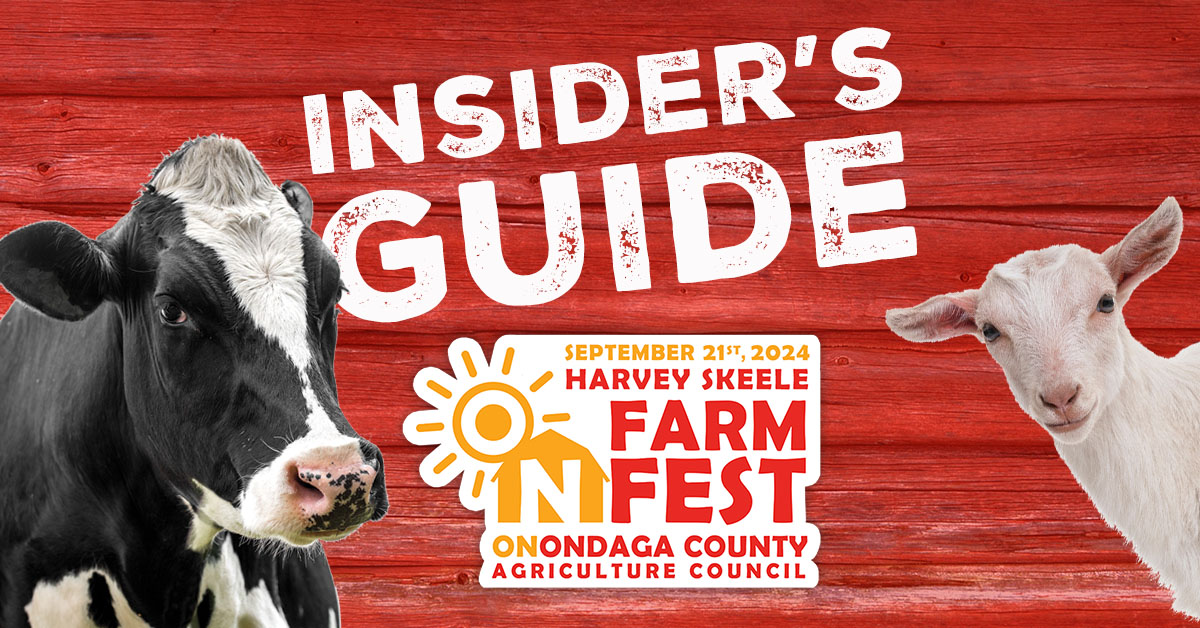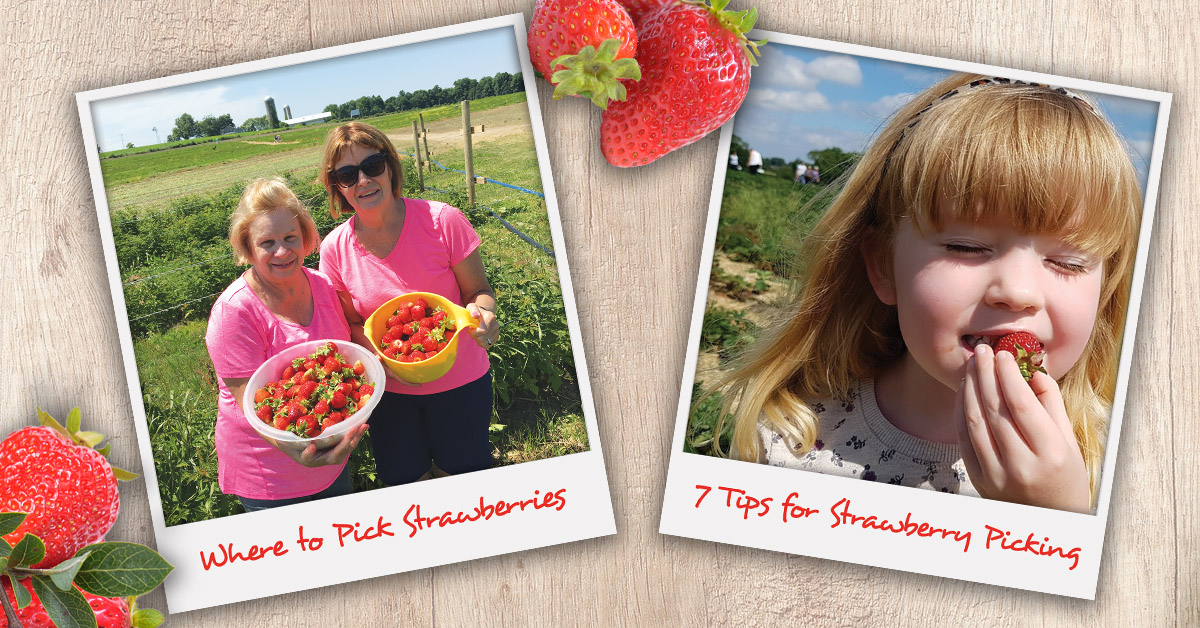Buy local. For the past decade, it’s been a rallying cry across the nation – and right here in Central New York. The phrase is even at the heart of the Onondaga County Agriculture Council’s “Buy Local. Buy Onondaga Grown” initiative.
However, we’ve heard from many people that actually buying local products can be challenging at times. So, we’re answering 5 questions asked by Onondaga County residents about how to buy local.
Q) “I’ve heard about your campaign. But I just want to know: why is it so important to buy local?”
A) “We’re glad you asked…here are 4 reasons.”
First, they say that to make a habit stick – like buying local – you need a really good reason, one that’s personal to you. We hope these facts inspire you to make the effort to buy local:
- Support over 570 farm families in Onondaga County. According to the most recent USDA Agriculture Census, there are over 570 farms in Onondaga County. These farms are run by families who live right here in CNY. In fact, did you know that 97% of all farms nationwide are managed by families?
- Keep our local economy going strong. There is a saying that you “vote” with your dollar. That means every buying decision you make has an impact that resonates beyond a single transaction. When you buy locally produced food, you’re investing in our county’s economy. After all, Onondaga County has the 10th largest agriculture economy in New York State, and it’s valued at over $356 million (based on the USDA Census as well).
- Local products often taste better. It’s the ultimate taste test. Try a tomato shipped in from California. Then bite into a tomato grown at a local farm. Chances are, the locally grown tomato tastes more flavorful and fresh. Why is that? First, many produce operations that ship out of state grow fruit and vegetable varieties based on factors OTHER than flavor: like thick skin to avoid bruising during shipment, or fast-growing varieties.
- It’s good for the environment. Speaking of produce shipments, research revealed that most produce found in grocery stores travels an average of 1,494 miles. If reducing your carbon footprint is important to you, buy local.
Because of all the benefits of buying local, Onondaga County Executive J. Ryan McMahon, II has continued to fully support the Buy Local. Buy Onondaga Grown. Initiative:
“One simple choice – like stopping at a local farmers market on the way home after work, instead of a superstore – creates a positive ripple effect. You’re bringing home higher quality, nutritious food to your family. At the same time, you’re helping a local farmer feed his or her family. You’re reducing your carbon footprint and putting money back into our local economy…it’s truly a win-win situation for all!”
Q) “I heard your commercial that there are over 60 dairy farms in Onondaga County. Where can I buy milk from these farms?”
A) “There’s a secret code you need to know…”
Many dairy farms sell their milk to what is known as a “cooperative.” The cooperative then combines milk from multiple farms, and either sells it directly to the public – or to a larger dairy company.
That means that a large brand like Kraft or Horizon Organic might include milk produced by a farm here in Onondaga County. The question is: how can you tell?
A great way to ensure you’re supporting New York State dairy farm families is to look for the number 36 on milk, yogurt, cream, and other dairy products.
If you want to support a specific Onondaga County dairy farm, just ask them which dairy brands use their milk…and buy those brands! Or, send us a message – and we can tell you.
Here is a list of companies and brands that purchase from local dairies:
- Organic Valley
- Byrne Dairy
- Byrne Hollow Farm
- Aldi Brand Happy Farms (processed by Byrne Dairy)
- Upstate
- Great Lakes Cheese
- Hillcrest Dairy/Ripley Family Farm
- Maple Hill Organic Creamery
- Hood Dairy
- Chobani
- Horizon Organic
- Trinity Valley Dairy
- Philadelphia Cream Cheese
- Cabot Creamery Co-operative (Cabot/McAdam brands)
Q) “How do I know that food at farmers markets is truly local?”
A) “Get smart about seasonality and don’t be afraid to ask!”
You know that bananas and oranges aren’t local. But what about those tomatoes you see at the farmers market in June?
Unless the farmer uses a high tunnel or hydroponic systems, those tomatoes are NOT grown in the Northeast. A handful of local farmers utilize these methods, like Diane Eggert of Cobblestone Creek Farm in East Syracuse:
“We use high tunnels – which are like large greenhouses – to extend our growing season. With the protection of the high tunnel, we can plant tomatoes and peppers in early spring without fear of frost, cold, and the elements. That means our tomatoes are often ready in June. Without the high tunnel, the earliest we’d have tomatoes would be late July.”
The weather is also a factor in seasonality. For example, this spring was abnormally cold and wet. This delayed strawberry season by as much as 3 weeks for some farms! However, it allowed some farms to plant vegetables that typically do better in the chilly fall air…like broccoli and dark leafy greens.
Review this chart of New York produce seasonality to educate yourself on what should be in season (give or take a few weeks). Then, don’t be afraid to ask the farmer if their produce, meat, eggs, or any other item is #OnondagaGrown!
Better yet, use our buy local map to seek out locally grown products – along with stores, restaurants, farmers markets, and other venues that sell them.
Q) “I’m interested in buying meat from a local farm. How do I know it’s the same quality as what’s in the grocery store?”
A) “Local meat is subject to the same USDA quality standards as the ‘big’ farms.”
The USDA along with the New York State Agriculture and Markets organization provides strict guidelines that meat producers must follow. That small beef farm down the road from you must process their beef at a USDA-inspected facility – just like larger commercial operations. For tips on buying beef, check out this article from CCE Tompkins.
Q) “What about beer? I know there are over 20 breweries in Onondaga County, but are they using local ingredients in the beer?”
A) “Yes, almost all breweries are buying hops and other ingredients from local farms – or even growing their own!”
It’s hard to believe that only a few years ago, you could count the number of Onondaga County breweries on one hand. Today, there are 22 breweries in operation – with many of them sourcing ingredients from nearby farms. Here are just 5 examples.
Griffin Hill – Located in Onondaga Hill, Griffin Hill farm raises their own hops which are included in their beer. You can buy Griffin Hill at the CNY Regional Market.
Heritage Hill Brewhouse & Kitchen – Take a ride out to Pompey to enjoy “brews with a view” at the site of Palladino Farms. What’s unique about Heritage Hill is that they actually grow their own barley for the beer they brew. You can see the barley fields from the brewery!
ONCO Fermentations – ONCO Fermentations in Tully purchases hops from Clark Hollow Hops. Clark Hollow Hops also provides numerous local, regional, and even national beer brands with their Onondaga Grown hops!
Local 315 Brewing Co. – Like Heritage Hill Brewhouse, the Local 315 Brewing Co. brewery is steps away from the fields where ingredients are grown. Instead of barley, Local 315 Brewing Co. produces their own hops in the on-site “Fawn Crossing Hops Farm.”
We hope these 5 insider tips have helped answer your questions about buying local. Have another question you’d like us to answer? Send us a message, here.






